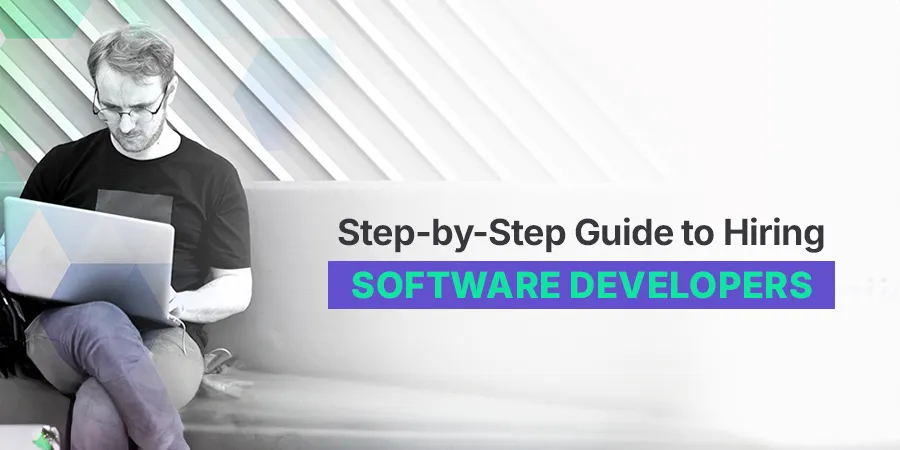5 Key Steps for Hiring Software Developers
After nearly two decades of building engineering teams—from startups to Fortune 500 companies—I’ve made every hiring mistake you can imagine. I’ve hired developers who looked flawless on paper but couldn’t quite deliver in practice. Others, less obvious at first glance, turned out to be the driving force behind major product breakthroughs.
Today, I want to share what I’ve learned about finding and hiring exceptional software developers. Whether you’re a startup founder hiring your first engineer or a seasoned CTO scaling your team, this guide will help you navigate the complex world of software developer recruitment.
Step-by-Step Guide to Hiring Software Developers

1. Define Your Requirements
Before you post a job or message a single candidate, you need to be clear on what you actually need. I’ve seen hiring efforts derail simply because the team wasn’t aligned on the role. I’ve even made that mistake myself.
I once brought on a brilliant React developer for a project—only to realize a few weeks in that what we really needed was React developer with deep backend API experience. No fault of the developer—they were great at what they did—it was just the wrong fit. And it set us back more than I’d like to admit.
To avoid that, I always start with a few grounding questions:
- What technologies are absolutely essential for this role?
- Do we need a self-starter or someone who thrives in a collaborative setup?
- What’s our delivery timeline?
- Are you looking for a generalist or a specialist?
2. Choose Your Sourcing Strategy
When it comes to finding the right developer, there’s no one-size-fits-all approach. There are several options for finding the right software developers, each with distinct advantages:
- Specialized platforms like Orbit.Work have been a game-changer. They focus solely on pre-vetted tech talent, which means companies are not wasting time sifting through questionable resumes. It’s a solid middle ground between speed and quality.
- Traditional job boards can still work, especially for more common roles. But be ready for a flood of applications—many of them not even close to what you’re looking for. The volume alone can eat up days.
- Recruitment agencies can be a real time-saver, especially when hiring for senior or urgent roles. But they come at a cost—usually 15–25% of the hire’s annual salary. Worth it sometimes, but not always the best option for budget-conscious teams.
- Freelance platforms offer the most flexibility and tend to be cheaper upfront. That said, quality varies wildly. I’ve found some amazing developers there, but only after investing serious effort into vetting.
3. Craft an Effective Job Description
Your job description is often the first real interaction a developer has with your company—so make it count. It should do more than list requirements; it should give a clear, honest picture of what the role involves and what it’s like to work with you. It should include:
- The specific technologies and tools your company uses
- What the developer will actually build (not just generic responsibilities)
- Your company culture and what makes you unique
- Clear information about compensation and benefits
- The actual problems you’re solving
Avoid corporate jargon and buzzwords. Developers can spot generic or inflated job posts a mile away—and it’s an instant turn-off.
4. Screen Candidates Effectively
Looking at resumes is just the surface. Over time, I’ve built a simple three-step approach that’s helped me identify strong technical and cultural fits without wasting time:
- Quick Technical Screen: A short, focused conversation to gauge their experience with our actual tech stack. This eliminates candidates who clearly don’t match the requirements.
- Technical Assessment: Either a coding challenge or pair programming session. I prefer live coding because it shows how they think and communicate.
- Cultural Fit Interview: This is where you determine if they’ll thrive in your environment. Ask about their preferred working style, communication preferences, and career goals.
5. Make the Offer and Onboard
Great developers usually have choices—your offer needs to stand out. It’s rarely just about money. What’s made a real difference in my hiring experience is offering flexibility, room to grow, real ownership, and work that actually matters. And once they join, don’t leave them hanging. Always set up a solid onboarding plan, pair them with a mentor, and make sure they’re set up to succeed from day one. That early experience shapes everything.
Why Use Orbit.Work for Hiring Developers

Traditional hiring often feels slow and hit-or-miss—especially when you need top developers, fast. That’s where Orbit.Work comes in. It’s built specifically for hiring technical talent, and it solves the problems recruiters have faced time and time again.
- Pre-vetted talent, no guesswork. Every developer on Orbit.Work is screened for tech skills, communication, and real-world experience. You skip the noise and only see candidates who are actually worth your time.
- Smarter matching, faster results. Instead of posting a generic job and hoping the right person finds it, Orbit.Work matches you with developers based on your exact needs—skills, experience, availability—all dialed in. The quality of matches is miles ahead of traditional job boards.
- Try before you commit. With their flexible model you can start with a trial or short-term project and see how a developer performs before going long-term. It takes the pressure out of hiring and gives you real insight into how they work.
- Quick turnaround. They deliver strong candidates within 48 hours. When hiring speed matters—and let’s be honest, it always does—that’s a huge edge.
Conclusion
Hiring great developers remains one of the most challenging aspects of building a successful tech company. The key is having a systematic approach that prioritizes quality over quantity and focuses on finding the right fit for your specific needs.
Whether you go the traditional route or use a platform like Orbit.Work, don’t forget: hiring is about people. The best developers want to solve real problems, work with sharp teammates, and feel valued.
Take the time to define what you really need. Be clear. Be intentional. And while the right hire is always worth the wait—with the right process, the wait doesn’t have to be long.
FAQs
1. How long does it take to hire a developer with Orbit.Work?
You can typically find qualified candidates within 24-48 hours of posting your requirements. The entire hiring process—from initial contact to starting work—usually takes 1-2 weeks, which is significantly faster than traditional methods that often take 4-8 weeks.
2. How is developer quality ensured on Orbit.Work?
Orbit.Work uses a multi-stage vetting process that includes technical assessments, portfolio reviews, and communication evaluations. Only the top applicants make it onto their platform. They also maintain ongoing performance metrics for all developers, so you can see their track record with previous clients.
3. What roles can I hire for — front-end, back-end, DevOps, etc.?
The platform covers virtually every software development role. Companies can hire front-end developers specializing in React and Vue, backend engineers with expertise in Node.js and Python, DevOps engineers, mobile developers, and even specialized roles like AI developers and machine learning engineers and blockchain developers.
4. Is Orbit.Work suitable for startups and enterprises alike?
Absolutely. For startups, the ability to start with project-based work and scale up is invaluable. For enterprises, the pre-vetting saves enormous amounts of time, and their enterprise features handle compliance and security requirements. The platform adapts to your needs regardless of company size.



